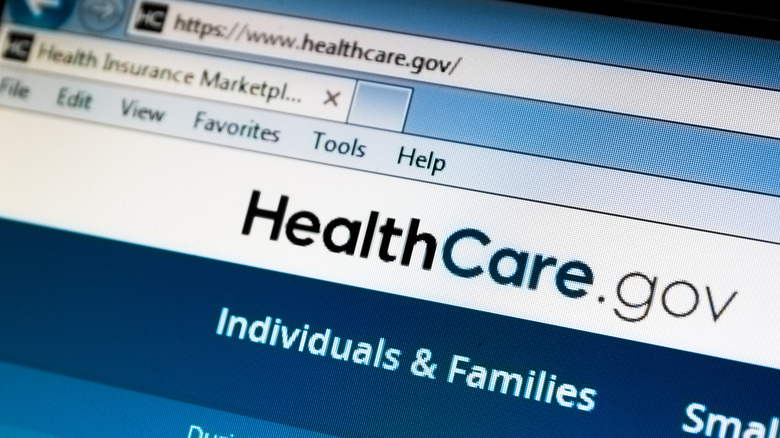As Health Insurance Open Enrollment Begins, Here's How To Spot Scams
As of November 1, the Affordable Care Act marketplace is now open for 2023 enrollment, offering healthcare plans to people in the U.S. without health insurance through their employer but who are also not eligible for federally funded health insurance plans (via The Philadelphia Inquirer). Navigating the marketplace on one's own can be challenging, and the Federal Trade Commission cautions that scams are common during the months of open enrollment. Here, experts explain how to be on the lookout for signs of health insurance scams versus legitimate coverage plans.
While they may resemble comprehensive health insurance plans at first glance, experts at NBC News report that low-cost health coverage alternatives, such as short-term health plans or (often religion-based) health care sharing ministries, can be somewhat deceptive in their offerings. Although not against the law, the financial protections offered by these plans are minimal and usually do not cover pre-existing medical conditions.
JoAnn Volk, co-director of Georgetown University's Center on Health Insurance Reforms, tells NBC News that individuals should be on the lookout for red flags such as sellers that inquire about one's health history, decline to provide written information about the insurance plan, or state they will only provide information once payment information is received.
Be sure to use trusted resources
The Federal Trade Commission advises that those seeking health insurance be mindful of the way in which sellers contact them, which could indicate a scam. Federal agencies do not reach out over the phone and ask for personal information, the FTC states. Therefore, it is a scam if a caller asks you to provide your social security number, bank account, or credit card information, or requests health insurance payment through wire transfer, cryptocurrency, or gift cards.
The same is true if a caller asks for personal information in exchange for a health plan price quote. Quotes can be calculated through HealthCare.gov and only require that one inputs their monthly income and age.
Another telltale sign of health insurance scams are callers that charge fees for services that are free of cost through legitimate coverage plans, notes the Federal Trade Commission. This includes charging a fee for a new Medicare card or charging for assistance navigating the Health Insurance Marketplace. While there are people that offer these services, known as Assisters or Navigators, it is at no cost to the individual.
If you're still unsure as to whether or not a health insurance plan is legitimate, check with your State Insurance Commissioner's Office to make sure they are licensed. Lastly, resources such as HealthCare.gov or state marketplaces are your safest bet for finding legitimate, comprehensive healthcare coverage, as these are verified government information sources.


